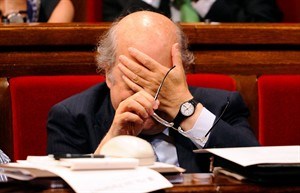
Catalonia's Economy Minister Andreu Mas-Colell reacts during a extraordinary parliamentary session on the fiscal pact at the Parliament of Catalonia in Barcelona, Spain, Wednesday, July 25, 2012. The powerful northeastern region of Catalonia admitted Tuesday it was studying a possible for request for help but said no decision had been made and stressed that the credit line did not constitute a rescue or bailout of the region. Since Friday, two regions, Valencia and Murcia, have said they will tap an a 18 billion euro emergency credit line the central government recently set up for cash-strapped regions.. (AP Photo/Manu Fernandez)
July 25, 2012 - 1:50 PM
MADRID - France and Spain called Wednesday for swift implementation of the rescue plan for Spanish banks to ease concern that the country may need a full-blown sovereign bailout.
In June, the 17 countries that use the euro agreed to lend Spain up to €100 billion (US$121 billion) to save those of its banks that are laden with soured investments following a property sector collapse in 2008.
But the deal only intensified concerns about Spain's debt levels, since the government initially will have to repay those loans if the banks cannot. In response, investors have since been demanding exorbitantly high interest rates to lend to the country.
To solve that problem, eurozone ministers agreed to give the loans directly to the Spanish banks — but only after a Europe-wide banking regulator is set up. That could take months, if not years. France and Spain said this step should be sped up and completed by the end of the year.
"The swift implementation of the financial assistance programme is essential to restore confidence and recreate conditions for growth," French Finance Minister Pierre Moscovici and Spanish Economy Minister Luis de Guindos said in a joint statement after talks in Paris.
The ministers said they did not think Spain's borrowing costs, which this week touched a euro-era record, reflect the country's financial position.
"We believe that the current level of interest rates prevailing in the sovereign debt markets does not reflect the fundamentals of the Spanish economy, its growth potential and the sustainability of its public debt," the statement said.
Both men said they were confident the rates would fall back once investors were confident that the country's banks were getting the support they need.
In the markets, however, Spain remained under intense financial pressure.
The yield, or interest rate, on Spain's benchmark 10-year bond spiked 0.11 percentage point to 7.65 per cent in the first hour of trading, before easing back to 7.37 per cent at the close of trading.
A rate above 7 per cent is deemed untenable over the long term — Spain has been suffering it for several weeks. Should Madrid find it too expensive to raise money from bond markets at such rates, it would have to ask for an international bailout like those sought by Greece, Ireland or Portugal.
Spain denies it will need financial rescue for its public finances, but many investors now think it's only a matter of time.
The country's benchmark IBEX 35 stock index closed 0.8 per cent higher, recovering only a fraction of the previous three days' heavy losses.
De Guindos' visit to Paris is part of the country's desperate battle to seek support and stave off a bailout. He met with Germany's Wolfgang Schaeuble in Berlin on Tuesday. Spain has also been pleading for the European Central Bank to intervene and buy its debt to ease get its bond yields down. But so far its demands have fallen on deaf ears.
Spain's economy is in its second recession in three years, chiefly because of a collapse of the property bubble that had fueled the economy for more than a decade. It is not expected to grow again before 2014 and unemployment is around 25 per cent.
Meanwhile, two regions — Valencia and Murcia — have since Friday said they will tap an €18 billion emergency credit line the central government recently set up for cash-strapped regions. More are expected to follow.
The powerful northeastern region of Catalonia said Tuesday it was also considering requesting help from Madrid, but stressed that the credit line did not constitute a rescue or bailout for the region.
Catalonia, with a debt of €42 billion, is Spain's most indebted region but also one of the top two contributors to the nation's GDP.
Many Spanish regions are so heavily in debt due to the recession and the real estate crisis that they cannot raise money on their own on financial markets.
Investor concern about regional debt grew sharply when the central government was forced to revise Spain's 2011 budget deficit upward for a second time to 8.9 per cent in May — an embarrassing adjustment that had to be made after four of the regions confirmed they had spent more than previously forecast.
_____
Harold Heckle in Madrid and Sarah DiLorenzo in Paris contributed to this report.
News from © The Associated Press, 2012